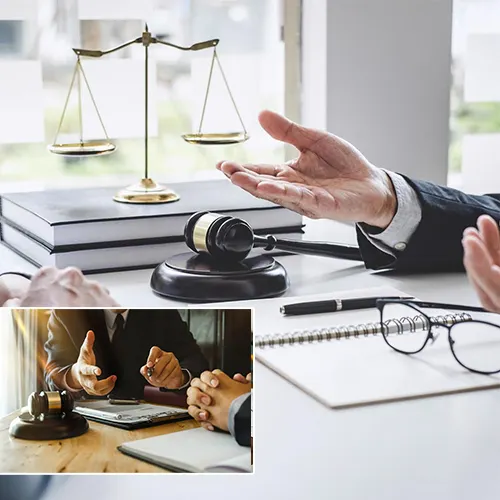Guide to Recording DUI Traffic Stops: Knowledge and Rights
Table of Contents []
Recording DUI Traffic Stops
Welcome to HPS LLC Your Guide to Recording DUI Traffic Stops Legally and Effectively

Have you ever been pulled over and found yourself unsure of what to do, especially if you're facing a DUI traffic stop? Well, you're not alone. Our mission is to empower drivers like you with the knowledge and the confidence to use your rights to the fullest, especially when it comes to recording traffic stops. At HPS LLC, we firmly believe that recording these encounters can serve as a pivotal safeguard, ensuring legal compliance on both sides of the badge.
Why is this important? Recordings capture factual accounts of traffic stops, which can be invaluable during legal proceedings. They help paint a clear picture of the event, often becoming key pieces of evidence. Nevertheless, there's a right way to do it, and we're here to guide you through the process. Plus, our legal experts are always on standby, ready to help you harness the power of your recordings.
If you have questions or need advice, HPS LLC and our team of legal professionals are available to help you nationally. Don't hesitate to give us a call at (512) 996-8944 for assistance or to book an appointment. We're here for you every step of the way.
Your Right to Record
First and foremost, let's clear something up: you have the right to record public officials, including police officers, during the course of their duties. Most states affirm this right, so long as you do not interfere with the officer's duties. But remember, laws can vary by state, so it's crucial to familiarize yourself with local regulations.
When you're recording, be upfront about it. Tell the officer that you are recording the stop. This isn't just about transparency; it also ensures that the recording is admissible in court. It's all about protecting your rights while staying within the scope of the law.
How to Record Safely and Respectfully
The key here is to record without getting in the way. Use a dashboard camera if you have one, or place your smartphone in a holder. Keep your hands where the officer can see them safety is always a priority during these encounters.
Always remain calm and collected, even if you disagree with the officer. Any hostile actions could escalate the situation, so focus on capturing the event rather than arguing. Your recording will be your voice later, should you need it.
What to Record During a DUI Stop
When recording, ensure that you're capturing everything: the officer's initial approach, their request for your documents, and any sobriety tests they administer. Don't forget to record their badge number and patrol car number too these are critical details that lend credibility to your recording.
It's also important to narrate what's happening if the video isn't clear. Your commentary can help clarify actions and events that might not be visible on camera.
Storing and Using Your Recording
Once you have your recording, make sure to back it up in a secure location. Cloud storage can be an excellent way to ensure it isn't lost or damaged. Should the need arise to use the video in a legal setting, reach out to HPS LLC. We can provide expert advice on the best ways to leverage your recording.
Remember, a video is a powerful thing. It can make or break a case. That's why it's crucial to have your recording ready and accessible should your legal team need it. We're here to help you do just that.
Best Practices for a Smooth Recording Experience

Here at HPS LLC, we recommend some best practices to ensure that your recording experience is not just within the confines of the law, but also as smooth and effective as possible. Whether you're a seasoned driver or new to the road, understanding these practices can make all the difference should you get pulled over for a DUI stop.
Remember, knowledge is power, and power can set you free. A strong recording can offer you peace of mind, knowing you have evidence that speaks truth, regardless of the situation. We're not just a name; we're a promise of support and guidance when you face trying times on the road.
Before the Stop: Preparing Your Vehicle
Preparation is key. Keep your recording device-whether it's a dedicated camera or your smartphone-easily accessible and ensure it's fully charged. Consider investing in hands-free devices like a dash cam that can record continuously while you drive.
Another smart move is to familiarize yourself with your recording equipment. Know how to start a recording quickly and, if necessary, how to securely broadcast the footage live. This upfront effort can make a real difference.
During the Stop: Conduct and Communication
Stay composed and cooperative during the stop. If you're asked to step out of the vehicle or conduct a sobriety test, comply calmly. Clearly communicate that you are recording and do so respectfully. Avoid making sudden movements or reaching for your recording device unexpectedly.
It's important to communicate with clarity. If you're nervous, a simple, "Officer, I am recording this stop for both of our protection," is all you need to say. This communicates your intent without escalating tension.
After the Stop: Reviewing and Sharing the Footage
Once the stop is over, it's time to review the footage. Check for clarity and ensure all relevant details were captured. If you need guidance on what to look for or how to proceed, (512) 996-8944 is your direct line to expert advice.
If you believe your rights were violated during the stop, don't go public with the footage right away. Instead, consult with a legal expert who can help you determine the most strategic steps to take. Rushing to share the video can sometimes complicate your position.
Respecting Privacy and the Law
While you have the right to record, it's important to respect privacy and confidentiality laws. This means being careful about how you share the footage of a DUI stop, especially if it captures personal information. Our team can help navigate these nuances.
Respecting the law includes understanding when recording might be prohibited. For example, recording a conversation that you're not a part of is often illegal. But when you're directly involved in a DUI stop, recording is generally within your rights, as long as you're open about it.
Understanding Your Rights and the Law

Navigating a traffic stop, particularly one involving DUI allegations, can be stressful. But, with HPS LLC by your side, you don't have to face it alone. Our in-depth understanding of your rights and the intricacies of the law is what sets us apart and keeps you safer on the roads.
Let's walk through what you need to know about recording DUI traffic stops. Having clarity on your legal rights will not only give you a sense of control but also ensure that your actions are always on the right side of the law. So, let's dive in and demystify the legal aspects of recording these critical moments.
Know Your State's Laws
State laws dictate what is permissible regarding recording police officers. While federal law generally allows recording in public spaces, state laws can impose specific requirements, like one-party or all-party consent for audio recordings. It's essential to do your homework know the laws in your state about recording traffic stops before you find yourself in one.
If the laws are confusing or you're not sure how they apply to your situation, that's what we're here for. Reach out to us, and we'll clarify any doubts and prepare you to handle a traffic stop with confidence.
Constitutional Protections
Under the First Amendment, you have the right to gather information about what public officials do on public property, provided that you do not interfere with their duties. This protection is your foundation when recording a DUI stop. It's crucial to remember that as long as you're not interfering, you're likely within your constitutional rights to record.
Police officers are also aware of these protections, but reminding them respectfully can ease the situation. Our experts can advise you on how to communicate your rights without escalating the encounter.
Recording in a Non-Confrontational Manner
Recording a DUI stop should never be about confrontation. It's a tool for accountability and protection. To keep the interaction as smooth as possible, politely inform the officer you are recording, and do not use the camera as an aggressive tool.
If you encounter resistance or are told to stop recording, remain polite and abide by the officer's request. You can always discuss this with your legal counsel after the fact to determine if your rights were violated. (512) 996-8944 is your best point of contact for quick legal advice.
The Importance of Non-Interference
While recording, it's imperative not to interfere with the police officer's duties. This means keeping a safe distance and not physically obstructing or hindering the officer in any way. Your aim is to document, not disrupt.
It's also key not to distract the officer from their procedures with unnecessary dialogue or questions. If you're silent or just narrating the events, you're more likely to have a recording that remains focused solely on the evidence rather than personal interactions.
Why Choose HPS LLC for Your Legal Support

At HPS LLC, we understand the plight of drivers nationwide. We've made it our purpose to stand with you during the trying moments of a DUI traffic stop. It goes beyond just offering legal advice; it's about providing a shield of expertise and representation that you can trust.
Our team doesn't just look at the recording; they analyze the full context of your traffic stop encounter. We piece together your narrative with the evidence, providing legally sound strategies should your stop lead to court proceedings. This comprehensive approach is the cornerstone of our support to you.
Access to Knowledgeable Legal Professionals
With HPS LLC, you gain access to a national network of legal professionals who specialize in DUI traffic stop recordings. Our team is adept at using such evidence in court and provides detailed advice on getting the best outcome from these recordings.
Whether it's understanding your rights, knowing how to present your recording, or preparing your defense, our professionals are always ready to assist. One call to (512) 996-8944 opens doors to the support and representation you need.
Education on Your Rights and How to Record Encounters
Ignorance isn't bliss, especially when it comes to legal encounters. We at HPS LLC are committed to educating drivers about their rights and the correct way to record DUI stops. This isn't about providing a simple checklist; it's about arming you with knowledge that translates into power.
Our resources, consultations, and seminars are designed to equip you with all you need to know. If you're ever feeling unsure, remember, the answers are just a call away at (512) 996-8944.
A Supportive Community Advocating for Your Rights
No one should face a DUI stop feeling isolated or powerless. By choosing HPS LLC, you become part of a community that advocates for your rights and supports you through every challenge.
Community means you never stand alone. It means that when you call (512) 996-8944, you're not just getting legal advice; you're gaining allies who are unyielding in their pursuit of justice and fairness for you.
Ready and Available, No Matter Where You Are
It doesn't matter if you're on a busy street in a bustling city or a quiet countryside road; HPS LLC is always within reach. Our nationwide network ensures that wherever you are, expert legal support is only a call away. No question is too small, no concern too trivial.
We understand the urgency that comes with DUI traffic stops, and that's why our responsiveness is unmatched. When you dial (512) 996-8944, expect timely advice and unwavering support tailored to your unique situation.
In conclusion, recording a DUI traffic stop can be your best defense in ensuring your rights are respected and the law is upheld. HPS LLC stands with you, championing your cause, arming you with knowledge, and bolstering your confidence in navigating these legal waters. Whether you're seeking advice, education, or need immediate support, our team is prepared to help. Connect with us today at (512) 996-8944, and let's ensure that justice is served and your voice is heard.
Previous Page
